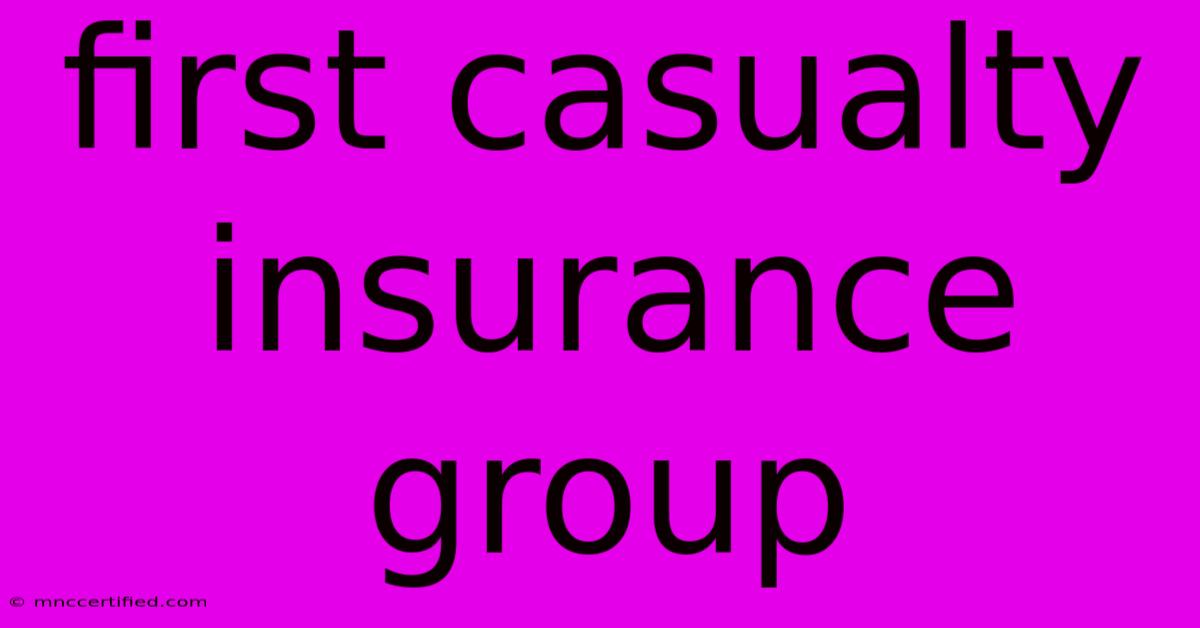First Casualty Insurance Group

Table of Contents
First Casualty Insurance Group: A Deep Dive into a Leading Provider
First Casualty Insurance Group, while perhaps not a household name, plays a significant role in the insurance landscape. Understanding their offerings, strengths, and potential weaknesses is crucial for both prospective clients and industry analysts. This article provides a comprehensive overview of First Casualty, examining its history, services, financial stability, and overall market position.
Understanding First Casualty Insurance Group's Core Business
First Casualty Insurance Group is a specialized insurance provider, focusing primarily on workers' compensation insurance. This niche market allows them to develop expertise and tailored solutions for businesses across various industries. They aren't your typical "one-size-fits-all" insurer; instead, they concentrate on providing comprehensive coverage and risk management strategies specifically designed for the complexities of workplace injuries and related claims.
Key Services Offered:
- Workers' Compensation Insurance: This is their flagship product, offering coverage for medical expenses, lost wages, and other liabilities stemming from workplace accidents. Their approach often involves proactive risk management consulting to help clients prevent accidents before they happen.
- Other Specialty Lines: While workers' compensation forms the core of their business, First Casualty may also offer other related insurance products, such as employer's liability insurance or umbrella coverage, to provide comprehensive protection for their clients. It's important to check their specific offerings for the most up-to-date information.
Assessing First Casualty's Financial Strength and Stability
For any insurance provider, financial stability is paramount. Before choosing an insurer, it's essential to assess their financial strength ratings. These ratings, provided by independent agencies like A.M. Best, provide an objective evaluation of the insurer's ability to meet its obligations. Checking First Casualty's ratings from reputable sources is crucial before making any decisions. Look for ratings from multiple sources to get a holistic view.
Factors to Consider Regarding Financial Stability:
- A.M. Best Rating: This is a widely recognized rating agency for insurance companies. A higher rating indicates greater financial strength and stability.
- Loss Ratio: This metric indicates the percentage of premiums paid out in claims. A lower loss ratio suggests efficient claims management and profitability.
- Underwriting Profitability: Consistent underwriting profits demonstrate the insurer's ability to effectively price policies and manage risks.
Note: Financial data can change frequently. Always refer to the most recent reports and ratings from reputable sources for the most current information on First Casualty's financial health.
First Casualty Insurance Group: Market Position and Competitive Advantages
First Casualty operates in a competitive market. Their focus on workers' compensation allows them to specialize and develop deep expertise in this complex area. This focus can provide them with competitive advantages:
- Specialized Expertise: Their deep knowledge of workers' compensation laws and regulations allows them to provide tailored solutions for their clients.
- Strong Claims Management: Effective claims management can lead to lower costs and better outcomes for both the insurer and the policyholder.
- Proactive Risk Management: By helping clients prevent accidents, they can reduce claims and improve overall safety.
However, it's important to remember that competition in the insurance market is fierce. Researching other providers and comparing their offerings is vital before committing to any insurer.
Conclusion: Making Informed Decisions About First Casualty
First Casualty Insurance Group offers a focused approach to workers' compensation insurance. Their specialization and potential expertise in this field can be beneficial to businesses seeking comprehensive coverage and proactive risk management. However, thorough due diligence is crucial before selecting any insurer. Independently verify their financial strength ratings, compare their services to competitors, and carefully review policy details before making a final decision. This ensures you choose the best coverage to meet your specific needs and budget. Remember to always consult with an independent insurance broker for personalized advice.

Thank you for visiting our website wich cover about First Casualty Insurance Group. We hope the information provided has been useful to you. Feel free to contact us if you have any questions or need further assistance. See you next time and dont miss to bookmark.
Featured Posts
-
Freeman 87 Makes Low Key La Outing
Nov 27, 2024
-
Rhode Island Renters Insurance
Nov 27, 2024
-
Ranchers And Farmers Insurance
Nov 27, 2024
-
Insurance Product Manager Jobs
Nov 27, 2024
-
Will Sporting Star Face Arsenal
Nov 27, 2024